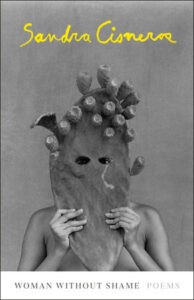
Sandra Cisneros on the Private Act of Writing Poetry
“I find writing poetry a most subversive act.”
The following first appeared in Lit Hub’s The Craft of Writing newsletter—sign up here.
*
August 30th, 2022, Casa Coatlicue, San Miguel de Allende
I am living since the year began in a great mental chaos, feral as an unmade bed. I don’t know if it’s me reflected in my surroundings, or if it’s my surroundings that make me chaotic. Some of this chaos are the books and papers leaning ominously everywhere I look, demanding I make time for them. They are worse than housework. They are homework. At least I can dodge housework; I can hire someone to help. But there is no one who can help me unpack the suitcases in my brain.
I call this management of the self, poetry. If I neglect it too long, I start to feel as if critters will move in. Call the exterminator!
Oh—I am the exterminator. That mouse trap is called my pen.
I consider poetry a dialogue with myself, a conversation more private than a journal. I am constantly in dialogue with myself and have been since I was a child. This comes from spending so much time alone and loving my time alone. Sometimes when I develop close friendships, I feel guilty I’m simply using them as an ear for the endless monologues going on in my head. Does everyone feel this way? I don’t know. I only know myself and how experience can only be understood when I translate it into words.
Every day, poetry summons me in the same way that the minarets let loose their silk call to prayer.
I write what I think, but how do I know what I think till I write it down? I’m not an abstract thinker. Ideas present themselves to me in vague, blurry emotions, as if everything I write comes to me by way of the heart, a muscle as strong as a python but as fragile as a lemon meringue pie. It’s only by running after poetry, because it takes a certain amount of stalking, that I find myself catching a hold of something furiously in motion that sweeps me up and carries me surprisingly aloft.
Every day, poetry summons me in the same way that the minarets let loose their silk call to prayer. I believe I could write several poems daily if I only answered the call. But I’m often distracted by an appointment I cannot cancel, or by a temperamental email tugging for my attention, or the body’s nagging need for a nap.
Poetry is a refuge from the mundane, an invitation to the sacred. That’s why I love reading poets who inspire poetry, who send me scurrying for my pen. If I am reading Bashō or Issa, I give myself permission to write shorter poems about nature. When I read Rumi, I’m moved to explore the spiritual.
Writing poetry is a most private act. It surprises me that my poems can be of any use to anyone else but me. Poems are so personal I regard them as I would X-rays of my uterus. It’s hard to imagine who would want to look at them besides me.
An unspoken rule that allows me to write poetry: I write poems as if I could not publish, print, read, or speak them in my lifetime. That’s why poetry is the one room in the house of the spirit where I am allowed to think anything I want. I find this startling, delightful, frightening, and hilarious, all at once. In this time of book banning and mistrust of truth, I find writing poetry a most subversive act.
It’s my personal aim in my lifetime to arrive at some semblance of empathy and kindness and acceptance of the difficult people in my life—my gurus, I’m certain. Poetry is my constant confessor. Non-judgmental. Indulgent. Benevolent. With faith that I will move from where I begin with my petty, small perspective and transform myself into a wannabe Boddhisattva.
If a poem is easy for me to write, I know I’m not trying hard enough. Poems are suspect when they present themselves easily.
That’s why so many of my poems are tossed under the bed for months and years, because I’m never sure if a poem has reached the door. By door, I mean taken me to a place I didn’t expect to go. That’s what a poem needs to do.
It is the job of scientists to explore black holes in the universe, but the job of a poet is to explore black holes in the psyche. I am still on a journey of self-discovery though I am sixty-seven years old and a half as I write this. I am serving my apprenticeship.
I’m lucky when poetry comes calling on a Harley, begging to take me on a spin—just around the block. But when I’ve gone missing for several days and return with my good clothes ruined, then I know I should’ve known. Poetry is part seduction, part abduction.
It’s thrilling, funny, and joyous, and I’m grateful to my readers. You are welcome to come along for the ride.
__________________________________

Woman Without Shame: Poems by Sandra Cisneros is available via Knopf.
Sandra Cisneros
Sandra Cisneros is a poet, short story writer, novelist, essayist, whose work explores the lives of the working-class. Her awards include NEA fellowships in both poetry and fiction, the Texas Medal of the Arts, a MacArthur Fellowship, several honorary doctorates and book awards nationally and internationally, and most recently Chicago’s Fifth Star Award, the PEN Center USA Literary Award and the National Medal of the Arts, awarded to her by President Obama in 2016. Founder of awards and foundations that serve writers and a dual citizen of the United States and Mexico, Sandra Cisneros earns her living by her pen.



















